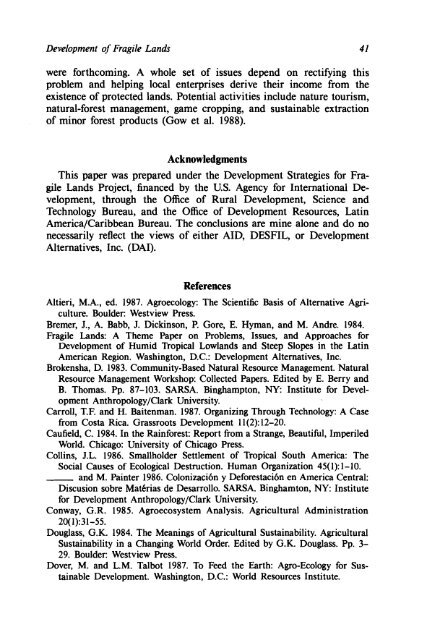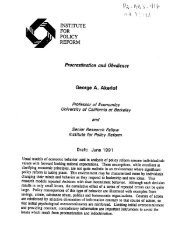Fragile Lands of Latin America Strategies for ... - PART - USAID
Fragile Lands of Latin America Strategies for ... - PART - USAID
Fragile Lands of Latin America Strategies for ... - PART - USAID
You also want an ePaper? Increase the reach of your titles
YUMPU automatically turns print PDFs into web optimized ePapers that Google loves.
Development <strong>of</strong> <strong>Fragile</strong> <strong>Lands</strong> 41<br />
were <strong>for</strong>thcoming. A whole set <strong>of</strong> issues depend on rectifying this<br />
problem and helping local enterprises derive their income from the<br />
existence <strong>of</strong> protected lands. Potential activities include nature tourism,<br />
natural-<strong>for</strong>est management, game cropping, and sustainable extraction<br />
<strong>of</strong> minor <strong>for</strong>est products (Gow et al. 1988).<br />
Acknowledgments<br />
This paper was prepared under the Development <strong>Strategies</strong> <strong>for</strong> Fra-<br />
gile <strong>Lands</strong> Project, financed by the U.S. Agency <strong>for</strong> International De-<br />
velopment, through the Office <strong>of</strong> Rural Development, Science and<br />
Technology Bureau, and the Office <strong>of</strong> Development Resources, <strong>Latin</strong><br />
<strong>America</strong>/Caribbean Bureau. The conclusions are mine alone and do no<br />
necessarily reflect the views <strong>of</strong> either AID, DESFIL, or Development<br />
Alternatives, Inc. (DAI).<br />
References<br />
Altieri, M.A., ed. 1987. Agroecology: The Scientific Basis <strong>of</strong> Alternative Agri-<br />
culture. Boulder: Westview Press.<br />
Bremer, J., A. Babb, J. Dickinson, P. Gore, E. Hyman, and M. Andre. 1984.<br />
<strong>Fragile</strong> <strong>Lands</strong>: A Theme Paper on Problems, Issues, and Approaches <strong>for</strong><br />
Development <strong>of</strong> Humid Tropical Lowlands and Steep Slopes in the <strong>Latin</strong><br />
<strong>America</strong>n Region. Washington, D.C.: Development Alternatives, Inc.<br />
Brokensha, D. 1983. Community-Based Natural Resource Management. Natural<br />
Resource Management Workshop: Collected Papers. Edited by E. Berry and<br />
B. Thomas. Pp. 87-103. SARSA. Binghampton, NY: Institute <strong>for</strong> Devel-<br />
opment Anthropology/Clark University.<br />
Carroll, T.F. and H. Baitenman. 1987. Organizing Through Technology: A Case<br />
from Costa Rica. Grassroots Development 1 l(2): 12-20.<br />
Caufield, C. 1984. In the Rain<strong>for</strong>est: Report from a Strange, Beautifid, Imperiled<br />
World. Chicago: University <strong>of</strong> Chicago Press.<br />
Collins, J.L. 1986. Smallholder Settlement <strong>of</strong> Tropical South <strong>America</strong>: The<br />
Social Causes <strong>of</strong> Ecological Destruction. Human Organization 45(1): 1 - 10.<br />
- and M. Painter 1986. Colonizaci6n y De<strong>for</strong>estaci6n en <strong>America</strong> Central:<br />
Discusion sobre MatCrias de Desarrollo. SARSA. Binghamton, NY: Institute<br />
<strong>for</strong> Development Anthropology/Clark University.<br />
Conway, G.R. 1985. Agroecosystem Analysis. Agricultural Administration<br />
20(1):31-55.<br />
Douglass, G.K. 1984. The Meanings <strong>of</strong> Agricultural Sustainability. Agricultural<br />
Sustainability in a Changing World Order. Edited by G.K. Douglass. Pp. 3-<br />
29. Boulder: Westview Press.<br />
Dover, M. and L.M. Talbot 1987. To Feed the Earth: Agro-Ecology <strong>for</strong> Sus-<br />
tainable Development. Washington, D.C.: World Resources Institute.

















